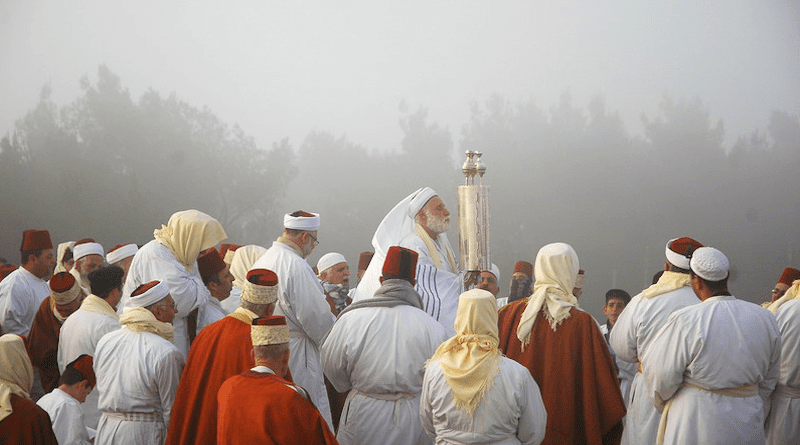Relationship Between Man And Religion: Inside And Out – OpEd
Religion refers to a set of beliefs, practices, and traditions that are centered around the worship of one or more gods, divine beings, or higher powers. It often involves the pursuit of a spiritual connection with the divine, as well as moral and ethical guidance for individual and community life. It plays a significant role in many people’s lives and provides a sense of purpose, comfort, and community.
Different religious traditions have their own beliefs, rituals, and practices, but they often share common themes such as the existence of a higher power, the importance of living a virtuous life, and the concept of an afterlife. Some of the world’s major religions include Christianity, Islam, Hinduism, Buddhism, Judaism, and Sikhism. Each religion has its own history, scripture, and religious leaders, and can vary greatly in terms of beliefs and practices.
While religion can bring people together and provide a source of comfort, it can also be a source of conflict and division. In some cases, religious differences have led to wars and other forms of violence, while in other instances, religious beliefs have been used to justify discrimination and oppression. Overall, religion is a complex and multifaceted aspect of human life that has had a profound impact on individuals, communities, and societies throughout history.
Origin of man
The origin of humans, or Homo sapiens, is a question that has been the subject of much scientific investigation and debate. According to the theory of evolution, humans evolved from ancestral primates over a period of several million years. The earliest human-like species are believed to have emerged in Africa around 7 million years ago. Over time, these species evolved and diversified, eventually leading to the evolution of Homo sapiens around 300,000 years ago. Homo sapiens are believed to have originated in Africa, where they lived as hunter-gatherers for tens of thousands of years.
Around 50,000 years ago, they began to migrate to other parts of the world, eventually populating Asia, Europe, and the Americas. Throughout this time, humans continued to evolve and adapt to their changing environments, developing new technologies, languages, and cultures. Today, Homo sapiens are the only surviving members of the genus Homo and are recognized as one of the most intelligent and culturally diverse species on the planet. While the exact origin of humans is still the subject of scientific investigation, it is widely accepted that evolution through natural selection played a major role in the development of Homo sapiens over millions of years.
Origin of religion
The development of religion has been a long and complex process that has taken place over thousands of years and has been shaped by a variety of cultural, historical, and social factors.
Religion is thought to have originated as a way for early humans to explain and make sense of the world around them, including natural phenomena such as lightning, earthquakes, and the movements of the sun and moon. Over time, these beliefs evolved into more complex religious systems with formal rituals and organized religious structures. As civilizations developed and became more complex, religion also evolved, with new beliefs and practices emerging and spreading among different cultures and societies.
In some cases, religion provided a source of comfort and guidance for individuals, helping them to cope with fear and uncertainty. In other cases, religion was used as a means of social control, with early leaders and elites using religious beliefs and practices to maintain power and order in their communities. With the rise of scientific discovery and the Enlightenment in Europe in the 17th and 18th centuries, religion was increasingly called into question, leading to a period of religious reforms and the development of new religious movements.
Today, religion continues to play an important role in many people’s lives and remains a powerful force in shaping cultural, social, and political structures around the world. The development of religion has been a long and ongoing process that reflects the diversity of human beliefs and experiences and continues to shape the world in which we live.
Relation between the two
The relationship between man and religion is a complex and varied one that has evolved over time and varies across cultures and individuals. For some people, religion provides a source of comfort, guidance, and meaning in their lives, while for others it is a source of conflict and division. Religion can serve as a way for individuals to connect with something greater than themselves and to find a sense of purpose in life. It often provides a moral and ethical framework that helps people make decisions and navigate their lives, and can also serve as a source of comfort during difficult times.
Religion can also provide a sense of community and belonging, bringing people together to worship, pray, and participate in religious rituals. In many cultures, religion is deeply intertwined with family and cultural traditions, providing a shared sense of identity and history. On the other hand, religion can also be a source of tension and conflict. Differences in religious beliefs and practices can lead to misunderstandings, prejudice, and even violence between individuals and communities. In some cases, religious beliefs have been used to justify discrimination and oppression, particularly against minority groups and women.
Overall, the relationship between man and religion is complex and multifaceted, reflecting the diversity of human experience and beliefs. While religion can have a positive impact on individuals and communities, it is important to approach religious differences with respect and understanding, and to strive for greater unity and tolerance.
Dr. Rajkumar Singh is a Youth Motivator, presently Professor of Political Science and Dean of Social Sciences along with Dean, Student’s Welfare (DSW), at B.N. Mandal University, Madhepura (Bihar), India. His 22 books published in addition to 900 articles in national and international journals and daily newspapers from 25 foreign countries.

